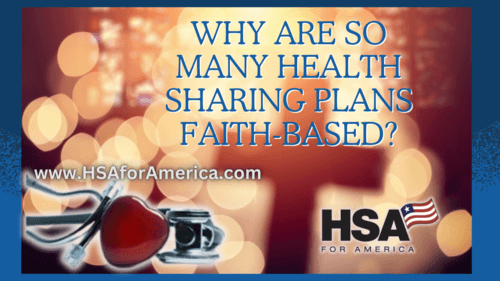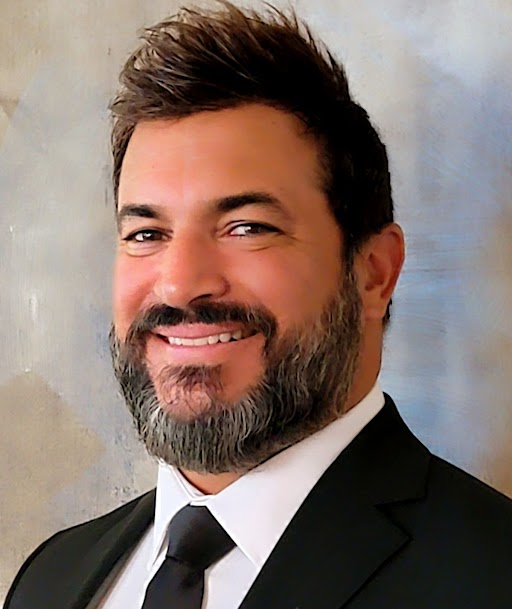While not all health sharing plans are explicitly religious in nature, and many are purely secular, most health sharing organizations are affiliated with religious organizations.

Christian Community Health Services
There are historical and cultural reasons for this: the modern health sharing organizations are rooted in faith-based mutual aid associations from over a century ago, with Amish and Mennonite communities in the United States pooling money together to help members of their community who were facing illness, injury, or hardship. facing medical debt.
Healthcare sharing ministries were designed to help members meet their medical expenses by pooling monthly contributions (shares) from members who share common religious beliefs based on Christian principles.
Over time, other affiliate groups established their mutual aid societies to help members in need, including much larger churches and other religious communities, immigrant organizations, patriotic organizations, and veterans groups.
But religious groups still formed the nucleus of the health sharing community, until the advent of workplace medical plans began to supplant them in the 1930s and through World War II.
Health sharing and mutual aid society membership gradually declined in the Post-War period. But experienced a resurgence in the 1980s, thanks to inflation and a steep surge in traditional health insurance costs, which led consumers to look for alternatives.
In response, several new health sharing ministries arose to meet the growing demand.
These newer organizations were much more sophisticated than their earlier mutual aid society predecessors, embracing modern technology and actuarial techniques to price memberships more efficiently and improve their competitiveness against traditional health insurance products.
Again, it was the religious-affiliated groups who had the upper hand, since these groups still maintained tight-knit communities which formed their membership base.
The modern healthcare-sharing ministry model emerged in the United States in the 1990s as a Christian-based alternative to traditional health insurance.
Compare Pricing on the Best HealthShare Plans Available
Health Sharing in the Era of Obamacare
Health sharing plans received another boost after 2010 when Congress exempted health sharing members from the Affordable Care Act’s health insurance mandate.
This was a provision in the federal tax code that imposed a monetary penalty on individuals and families who did not carry creditable health insurance coverage during the year.
This spurred thousands of other families to investigate health sharing as a viable alternative to Obamacare products available on the exchange.
Health Sharing Today
Today, many faith-based health sharing plans require members to adhere to certain religious or lifestyle guidelines, such as professing the Christian faith, attending church regularly, and abstaining from tobacco, drugs, and excessive alcohol use.
While not every health sharing plan available today is directly affiliated with a specific religious community, most do expect members to live responsible, health-conscious lifestyles as a condition of membership.
While most health sharing organizations adhere to Christian principles, there are some non-Christian health share organizations, such as Refuah, which serves the Jewish community, and other plans don’t have any religious affiliation at all.
Learn More: The History of Health Sharing
Why Do People Flock to Religious-Based Health Share Plans?
Many people believe you have to be part of a religious organization to enroll. And while there are many faith-based health sharing plans to choose from, this is not necessarily a requirement for all of them.
But people of faith often have a problem with the practices upheld by many health insurance companies and political figures.
For example, qualified ACA plans frequently include procedures that many Christians oppose, such as abortion, in vitro fertilization, and gender reassignment surgeries.
As a result, some of the money you contribute to traditional insurance plans could be used to fund these procedures.
There is value in aligning with healthcare organizations that uphold the same beliefs you do. And that’s where health sharing comes in!
How to Choose a Health Sharing Plan
When considering a health sharing plan, there are several factors to keep in mind:
- There may be limits on what can be shared, so understanding each program’s specific guidelines is crucial.
- Routine checkups and preventive screenings might not be covered, potentially requiring out-of-pocket payment or membership in a direct primary care (DPC) practice.
- You might need to pay some costs upfront and submit receipts or a superbill to your health sharing organization for reimbursement after services are received.
- Generally, there are waiting periods for sharing costs related to pre-existing conditions and surgeries, making it essential to research these details.
- Unlike traditional health insurance premiums, contributions to health sharing plans are not tax-deductible.
While this is all important to understand, the overall savings outweigh the costs for many, especially for those who are not eligible for ACA subsidies. You can save up to 50% compared to unsubsidized traditional health insurance premiums!
If you want the best of a health sharing plan and traditional insurance, you can also look into the HSA MEC plan. Connect with a Personal Benefits Manager if you want to know more about any of these programs.
The Best Faith-Based Plans
Medi-Share is one of the oldest and largest Christian health sharing ministries in America.
Members agree to live a healthy lifestyle inspired by the teachings of the Bible. There is an overall satisfaction rate of 98%, and individual memberships can be as low as $135 per month. This includes access to telemedicine and a dental discount program.
There are three options to choose from: Catastrophic, Classic, and Complete.
Each option comes with different monthly contributions, member responsibility amounts, and more. Plans start as low as $115 per month, and all plans include access to telehealth and mental health services.
This plan is great for families.
It allows flexible access to doctors as needed. If one family member develops a health issue, they can use more doctor visits without increasing the price for the plan.
In addition, it is one of the most affordable plans on the market, at only $105 per month for an individual.
This plan can be a little more expensive than competing plans, but they also offer better health protection and extra services.
The Elite + plan allows for sharing for both primary and emergency medical care, which is not something found in many other plans. Their catastrophic option is around $144 per month, with additional discounts if you use a netWell provider network.
Prosper is an affordable, streamlined, and cost-effective solution from Universal Health Fellowship. The plan is built on the principles of Unitarian Universalism.
This high-value plan may be a good match if you want to join a faith based community, but you aren’t comfortable with other health sharing plans’ requirements to attend services with a specific denomination, you want a completely non-denominational approach, or you don’t hold to an orthodox Christian trinitarian theology.
Health Sharing Myths and Misconceptions
Even though health sharing plans are becoming more popular, they are still frequently misunderstood by both consumers and the news media.
Q: Are health sharing plans a type of health insurance?
A: No. They are medical cost-sharing arrangements among like-minded members, not insurance products. It’s important not to confuse the two types of plans.
Q: Do health sharing plans lack regulatory oversight making them less reliable than traditional insurance?
A: Not necessarily. While they are typically not regulated the same way as insurance, health sharing plans are still subject to state contract laws, and laws against fraud and misrepresentation, and are still subject to tort remedies in the case of any wrongdoing.
Q: Do health sharing plans cover pre-existing conditions?
A: Yes, but usually after a waiting period, which can be anywhere from 90 days for surgeries (other than emergency surgeries and to treat unforeseeable injuries) to several years in the case of more serious pre-existing conditions.
Q: Is health sharing exclusively for Christians?
A: No. While many health sharing organizations are faith-based to allow people to align with others who believe as they do, some are open to members of any religion, and some are entirely secular.
Q: Are health sharing members restricted to a limited network of healthcare providers?
A: Typically, no. In fact, the lack of network restriction is one of the best reasons to join a health sharing program. Most plans offer a great degree of flexibility in choosing your own providers.
Q: Are health sharing plans only for healthy individuals?
A: Not necessarily. While health sharing plans are wonderful options for people in good health who are committed to living a healthy lifestyle, they can provide for a wide range of medical needs.
New members should understand any waiting period requirements, and how they may affect them if they seek care for a related condition.
Q: Are health sharing plans affordable?
A: Yes! They are often significantly more affordable than traditional health insurance, with monthly share amounts starting as low as $89.
While health sharing plans differ from traditional insurance in important ways, they are an excellent alternative for people who want more freedom and flexibility in their healthcare choices. And they are a particularly good choice for those who want to align with a community that has the same beliefs.
Compare Pricing on the Best Insurance Plans Available
Upholding Christian Values
Health sharing has strong ties to faith communities, and provides a way for people with a strong belief system to feel good about their healthcare choices.
The practice of sharing support and resources within a community has been going on for centuries. The combination of more affordable coverage, great benefits, and the ACA exemption have all contributed to their rising popularity of health sharing across the country.
If you would like a healthcare program that can provide the services you need while upholding the principles you cherish, reach out to a Personal Benefits Manager today.
Our health sharing experts will connect you with the best possible plan for your budget. And you can feel assured that the money you are contributing to a faith-based plan is being used to support others also with the same Christian values.
For Further Reading: How a Christian Healthcare Sharing Ministry Can Benefit Your Church, and It’s Congregation | Christian Health Insurance [2026 Guide] | Unraveling Healthcare Sharing Ministries: Faith-Based and Secular HealthShare Options

Hi! I’m Mike Montes, and I’m one of your Personal Benefits Managers. I like working with HSA for America because we’re creating solutions to healthcare problems. Our focus on money-saving alternatives like HSA plans and health sharing programs, and the variety of health share programs we offer, are what set us apart. Read more about me on my Bio page.


